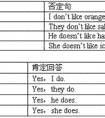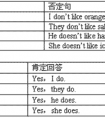Shall we ____? [ ]A. rowing B. play rowing C. go rowing-三年级英语
题文
| Shall we ____? |
| [ ] |
| A. rowing B. play rowing C. go rowing |
答案
| C |
据专家权威分析,试题“Shall we ____? [ ]A. rowing B. play rowing C. go rowing-..”主要考查你对 实义动词,动名词 等考点的理解。关于这些考点的“档案”如下:
实义动词动名词
考点名称:实义动词
实义动词:
与系动词是相对的,系动词亦称连系动词,作为系动词,它本身有词义,但不能单独用作谓语,后边必须跟表语(亦称补语),构成系表结构说明主语的状况、性质、特征等情况。
实义动词意思完全,能独立用作谓语。
实义动词有及物动词和不及物动词(及物动词是指后面要求有直接宾语的动词;
不及物动词指后面不需要跟宾语的动词)即行为动词,表示动作的动词。
实义动词(又称行为动词):表示行为或状态,有完全的词义,能独立作谓语。
如:I go to school by bus. 我乘公交车去上学。
The students clean their classroom every day. 学生每天打扫教室。- 及物动词:
后面必须跟宾语,意义才完整的实义动词,叫做及物动词(transitive verb)。
英语中的及物动词有:interest,worry,guss,please,surprise,love等
例如:I believe that the committee will consider our suggestion.我相信委员会将会考虑我们的建议。
“How long can I keep the book ”Harry asked.哈里问:“这本书我可以借多久?”
Dr. Bethune set us a good example. 白求恩大夫给我们树立了好榜样。
Crude oil contains many useful substances.原油含有许多有用的物质。
不及物动词:
本身意义完整,后面不用跟宾语的实义动词,叫做不及物动词(intransitive verb)。
Birds fly.鸟会飞。
It happened in June 1932.这件事发生于一九三二年六月。
My watch stopped.我的表停了。
She spoke at the meeting yesterday evening. 她在昨天晚上的会上发了言。
兼作及物动词和不及物动词:
英语里有不少实义动词可以兼作及物动词和不及物动词。
这样的动词又有两种不同的情况:
a)兼作及物动词和不及物动词时,意义不变。试比较:
Shall I begin at once?我可以立刻开始吗?(begin作不及物动词)
She began working as a librarian after she left school.她毕业后当图书馆管理员。(began作及物动词)
When did they leave Chicago?他们是什么时候离开芝加哥的?(leave 作及物动词)
They left last week. 他们是上周离开的。(left 作不及物动词)
b)兼作及物动词和不及物动词时,有时意义不尽相同。如:
Wash your hands before meals.饭前要洗手。
Does this cloth wash well? 这布经得起洗吗?
与汉语的比较:
有时英语动词的及物和不及物的用法,与汉语的用法完全不一样,请注意下列两种情况:
a)有的动词在英语里只能用作不及物动词,而汉语则可用作及物动词,如arrive到达,agree同意,listen听。英语里这些动词后面常接介词。如:
We arrived at the railway station at noon.我们于中午到达火车站。(at不能省去)(比较:We reached the railway station at noon.)
Everybody listened to the lecture with great interest.每个人都很有兴趣地听讲课。(to不可省去)(比较:We all heard the lecture.)
Do they agree to the plan?他们同意这个计划吗?(to不可以省去)
b)有的动词在英语里能用作及物动词,而在汉语里则不能用作及物动词,如serve为…服务。
Our children are taught to serve the people wholeheartedly.我们的儿童被教以全心全意为人民服务 - 特殊实义动词:
英语动词很多既是及物动词又是不及物动词,如
close, begin, study, leave, work等。
①The post office closes at 9:00 p. m.邮局晚上9点关门。
②Close the window,please.请关窗。
③Shall we begin now?我们现在开始吗?
④ Bill began working as a sailor after he left school.比尔毕业后当水手。
⑤They left yesterday.他们昨天离开的。
⑥When did you leave Washington?你什么时候离开华盛顿的?
⑦The students study hard.这些学生学习努力。
⑧The students study English and German.这些学生学习英语和德语。
⑨He works in a supermarket.他在一家超市工作。
⑩He works the machine on Mondays.他星期一操作这台机器。
考点名称:动名词
- 动名词:
如果一个动词加上了-ing变成了名词,那么这个词称动名词。 动名词是一种兼有动词和名词特征
的非限定动词。它可以支配宾语,也能被副词修饰。动名词有时态和语态的变化。
例:Reading is an art. 读书是一种艺术。
Swimming is a good sport in summer. 游泳是夏天一项好的运动。
There is no saying when he'll come. 很难说他何时回来。
No smoking. (=No smoking is allowed here) . 禁止吸烟!
No parking. 禁止停车!
Let’s go shopping. 让我们去购物。 动名词常见题型:
1)动名词做主语时,谓语动词为单数
2)在动名词和不定式中,作为介词的宾语是动名词
3)动名词的否定直接在其前加否定词,通过代词的宾格或所有格形式给出逻辑主语
例:
I would appreciate_______ back this afternoon.
A.you to call
B.you call
C.you calling
D.you’re calling
(Key:C;换成your calling也对)
4)有些词后只能接动名词
acknowledge;admit; advise;advocate;allow;appreciate; avoid; celebrate; consider; contemplate; defer; delay; deny; detest; discontinue; dislike; dispute; enjoy; it entails; escape; excuse; explain; fancy; feel like; finish; forgive; can’t help; hinder; imagine; it involves; keep; it means; mention; mind; miss; it necessitates; pardon; postpone; practice; prevent; recall; report; resent; resist; risk; suggest; understand...
5)另外还有一些接-ing形式的常用说法
it’s no good; it’s no/little/hardly any/ use; it’s not/hardly/scarcely use; it’s worthwhile; spend money/time; there’s no; there’s no point in; there’s nothing worse than; what’s the use/point...
6)有些词后面加不定式和动名词均可
remember,forget,try,stop,go on,continue,stop,regret,cease,mean后面均可用不定式和-ing形式,但意义截然不容。
例:
remember to do/doing:
①I remembered to post the letters.(指未来/过去未来将要做的动作)
②I remembered posting/having posted the letters.(我记得做过这个动作)
forget与remember的用法类似。
regret的用法:
①I regret to inform you that…(我很遗憾地通知你……)
②I regretted having left the firm after twenty years.(为了“二十年前的离开”而遗憾。)
try to(努力)与try +–ing(试验):
①You really must try to overcome your shyness.
②Try practicing five hours a day.
- 最新内容
- 相关内容
- 网友推荐
- 图文推荐
| [家长教育] 孩子为什么会和父母感情疏离? (2019-07-14) |
| [教师分享] 给远方姐姐的一封信 (2018-11-07) |
| [教师分享] 伸缩门 (2018-11-07) |
| [教师分享] 回家乡 (2018-11-07) |
| [教师分享] 是风味也是人间 (2018-11-07) |
| [教师分享] 一句格言的启示 (2018-11-07) |
| [教师分享] 无规矩不成方圆 (2018-11-07) |
| [教师分享] 第十届全国教育名家论坛有感(二) (2018-11-07) |
| [教师分享] 贪玩的小狗 (2018-11-07) |
| [教师分享] 未命名文章 (2018-11-07) |




![We ____________together. [ ]A. read a bookB. sleep-一年级英语](http://www.00-edu.com/d/file/ks/4/1/60/2019-08-28/smallea4b9832081df346c35e7fe937dd76101566947664.gif)
![What's he doing? He's ___________. [ ]A. readingB. drawing-四年级英语](http://www.00-edu.com/d/file/ks/4/1/60/2019-08-28/small07eb195a0f249b46b2d76d31ab9e28261566947675.jpg)
